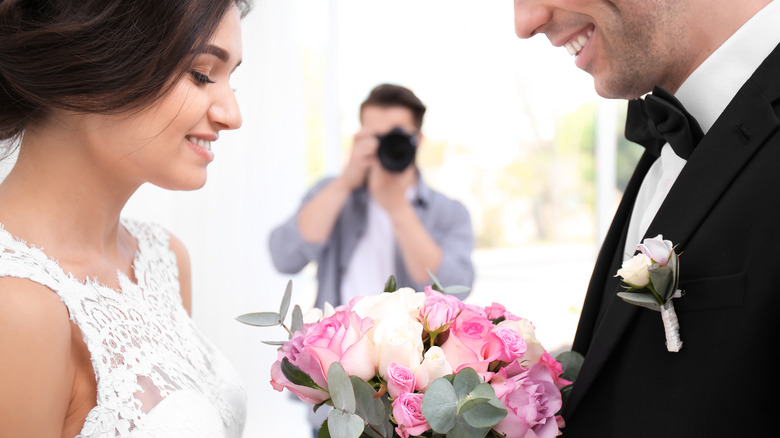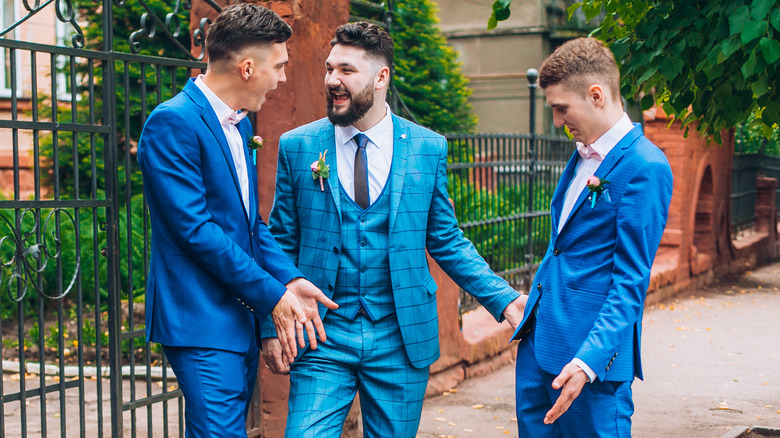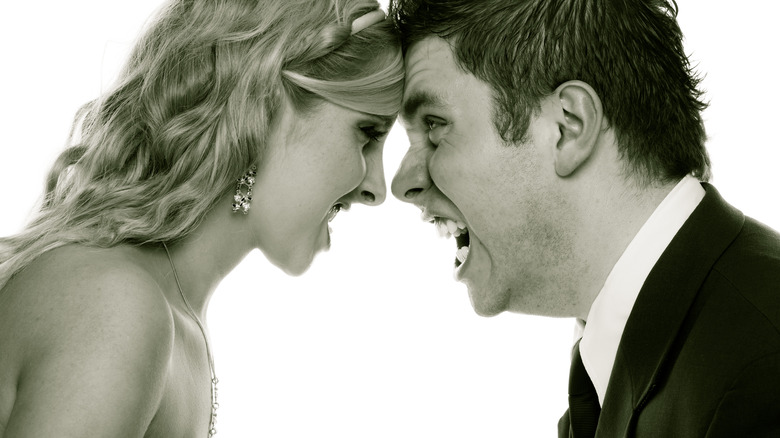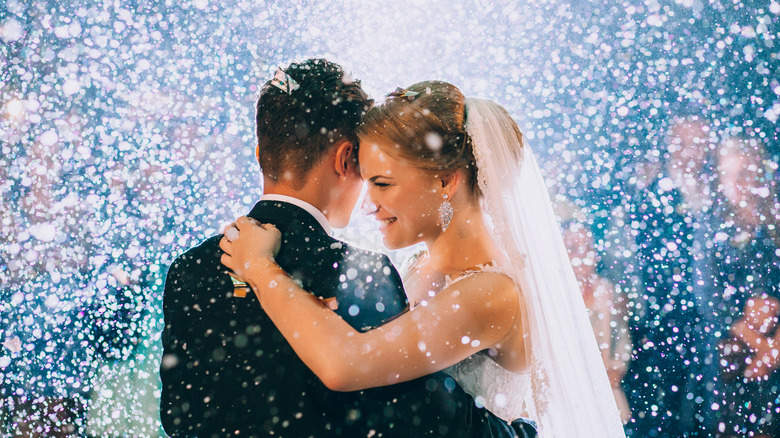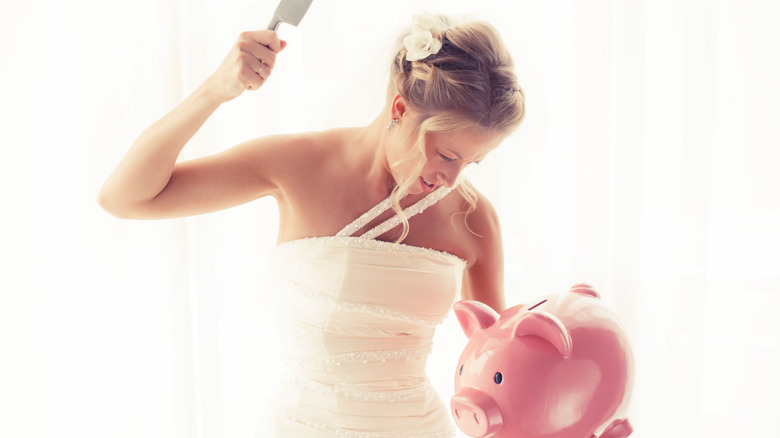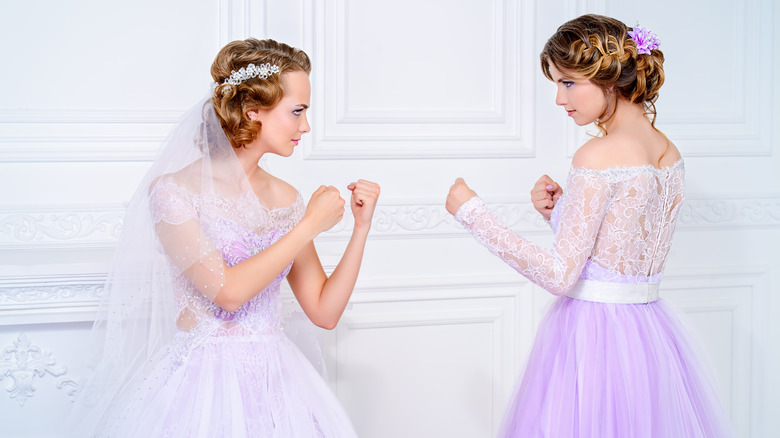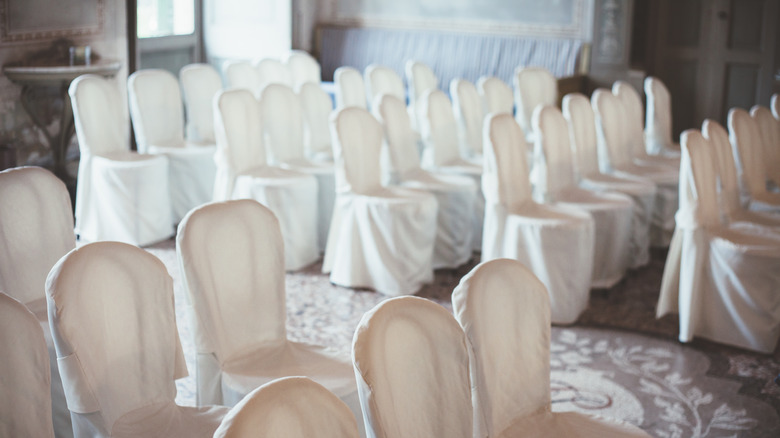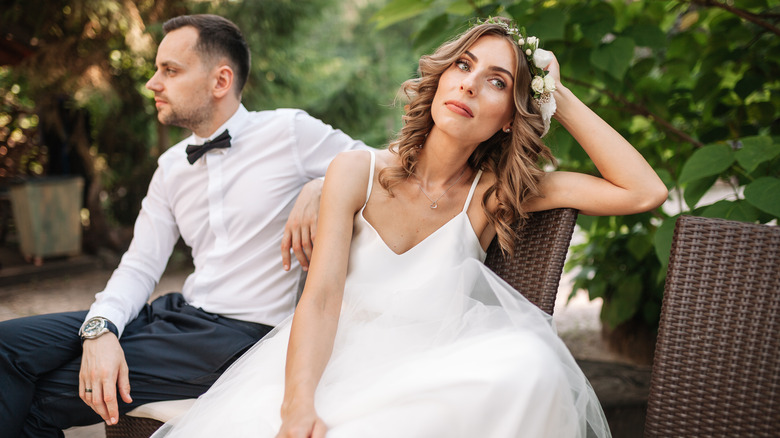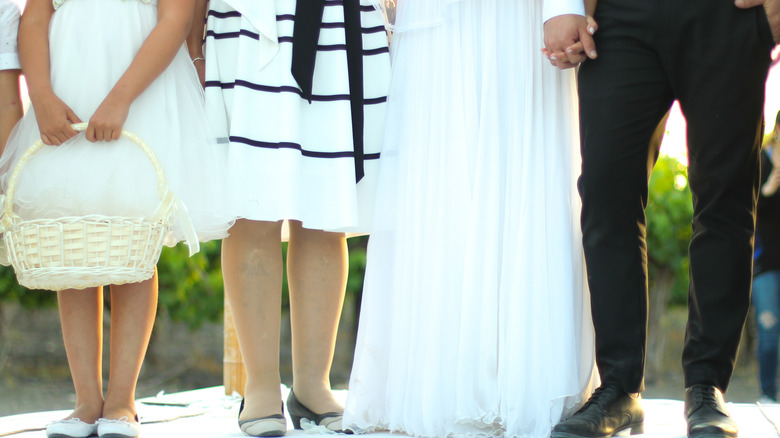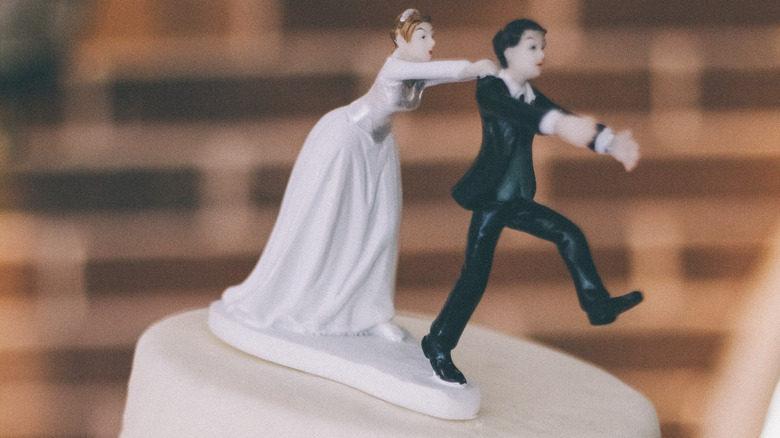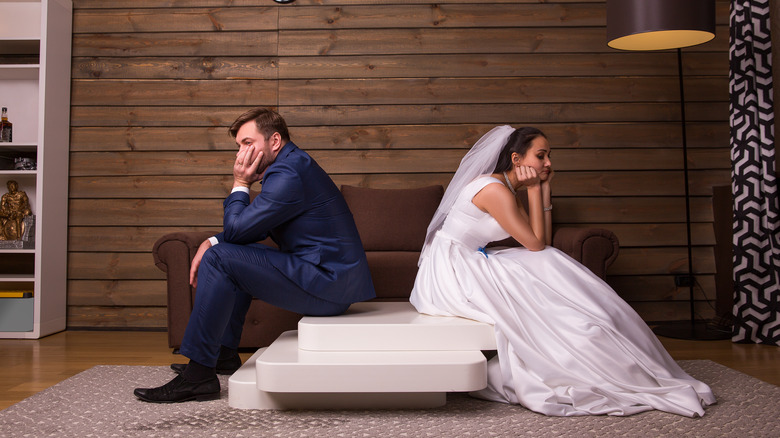How Wedding Photographers Know A Marriage Won't Last
One of the biggest parts of wedding planning — in addition to deciding on a location, venue, officiant, and managing a million little details — is choosing a photographer. According to Wedding Wire, most couples spend an average of $2,000 on wedding photography, and the photographer usually accounts for about 12 percent of peoples' wedding budgets.
In addition to using a photographer to document the wedding day, many couples choose to do an engagement session with the same photographer they've hired for their wedding. As a result, he or she will wind up seeing a lot of their clients — which, in turn, means that they have a front-row seat to the dynamics between the couple, their families, friends, and any drama that ensues. Over the years, many wedding photographers have developed a keen eye for the factors that get marriages off to a bad start. Read on to hear what they've learned!
The couple spends the reception apart
The best part of a wedding reception is the fact that it's basically a giant party with all your favorite people in one place — but as Les Hanna, a wedding photographer based in Central Florida, explained to The List, it can be problematic when "new brides and grooms (usually grooms) [are] more interested in partying with their friends than their new spouse at the reception."
Gretchen Wakeman, a Phoenix, AZ-based wedding photographer, echoed this sentiment to HuffPost. "While it's normal for couples to "spend the evening greeting guests, dancing the night away, and celebrating their new marital status, [red flags go up] when a couple separates to talk to guests or leaves the other alone on the dance floor for hours at a time. ...I have photographed an entire reception and only captured a handful of images of the couple together — that's a very bad sign."
So, while spending some time apart from your newly-minted spouse during the reception is certainly within the realm of normalcy, barely seeing each other at all is a notable cause for concern.
The couple argues often
Not surprisingly, a huge red flag is when the couple doesn't get along or is arguing a lot — especially on their wedding day.
Lisa Mark and Rebecca Lozer, wedding photographers and co-hosts of The Secret Life of Weddings podcast, told The List that they get concerned whenever arguments ensue during the photo sessions, or when there's "any major lack of connection between the couple." This lack of affection and connectedness "sends a message out that something is off, and this marriage may not last very long after the 'I do's."
Brandon Ballweg, a Kansas-based wedding photographer and owner of ComposeClick, shared this assessment: "In my opinion, the biggest sign that a marriage won't last is when a couple just doesn't get along on their wedding day." He continued, "The couples that I've photographed whose marriages have lasted showed each other their undivided attention on their wedding day and are excited, happy, and getting along so well it's like they're walking on a cloud."
Disrespect is the norm
Another sign that a couple may be a bad match? A clear lack of respect from one, if not both, of the partners. "Over my 12 years of doing weddings, I feel like the one thing I can boil it down to on the day of is just how they respect each other," wedding photographer Clane Gessel told Romper. "I feel like on the actual wedding day, more so than on any other day, their true character can come out because of all of the stress and the pressure and all the things going on."
Boston-area wedding photographer Kristin Griffin shared similar observations with The List, noting that specific behaviors like constant nagging or "shutting down the other person's opinion in a cruel way" can indicate that the marriage is already on the rocks. "I do worry about couples, though, when one person dismisses the other's ideas without hearing them out," she explained. "And don't put down the other's person's ideas in a cruel manner, even if you don't agree. You may hurt their feelings more than they let on, and that's never a good starting place for a marriage."
All the attention is on the wedding, not being married
While weddings are undeniably exciting, UK-based wedding photographer Moritz Schmittat told The List that when a couple places more emphasis on the wedding day than on being married, it can indicate trouble ahead.
It can be a bad sign when "a bride cares more about 'the stuff' (the dress, location, cake, etc.) rather than her partner," Schmittat said. "If a wedding is more about the bride rather than the couple, I'd leave with mixed feelings. You're not getting married for the sake of having an amazing wedding day, but for the lifetime that comes afterwards. ...If a wedding feels more like an event rather than the beginning of something bigger, I'm not too sure if their relationship stands on firm ground."
Like many other potential red flags, this depends on the degree of severity: it's normal to be excited about the wedding day, but if that excitement eclipses — or is at the expense of — a person's excitement about being married, then it can be a telltale sign that the relationship isn't as solid as it should be.
The budget is out the window
As Miami-based wedding photographer Carlos Osorio told HuffPost, disregarding the budget is problematic. "Money is an important factor in all marriages and often plays a part in why they fail," he noted. This observation was backed up by Idaho-based photographer Bryana Likes, who told The List that "...what those failed relationships typically had in common was that they seemed to worry so much about making the wedding 'picture perfect' — even if it didn't work for the budget. Those couples who go with the flow, focusing mainly on each other during the wedding are the ones who usually last. Most likely because you can tell from day one that they are in it for each other."
These observations were corroborated by a 2014 paper published by professors from the University of Singapore School of Public Policy and the Emory University Department of Economics. The paper examined the connection between wedding-related expenses and the length of time a couple remained married — and the more a couple spent on their wedding, the shorter their marriage wound up being.
The couple accrues debt from the wedding
Similar to the problem of saying "budget, schmudget," another sign of trouble is when a couple goes into debt to throw a lavish, over-the-top wedding.
Jimmy Chan, a Montreal-based wedding photographer and owner of Pixelicious, told The List that "piling on debt for the wedding in particular is a sign that the wedding won't last. It's unfortunate that brides are pressured to chase the perfect wedding, requiring them to splurge beyond their means. When the cash gift from the receiving line isn't enough to cover the reception expenses, the newlyweds start their new life deep in the red. ...Our main recommendation is to avoid debt at all cost."
Instead, finance expert and founder of LexION Capital, Elle Kaplan, told Brides that before a couple is neck-deep in wedding planning, they should "sit down and determine which budgeting issues are important to them, and which ones they don't really care about. You can stretch your budget by spending less on the unimportant costs, and avoid squabbles by allocating more towards hot-button issues."
There's lots of family drama
According to Griffin, discord between a person's partner and their family or friends is a sign that hard times are ahead. "Disrespect for the other person's family or friends [is a huge problem]," she explained. "It's true that you don't just marry your partner, you also marry their family. And their friends are part of the package, too! This can cause a lot of strife, especially if you don't initially get along with your in-laws or your partner's best friend. ... If you can find ways to at least be civil with each other, it'll make for a much smoother married life."
Chan made a similar statement to Romper, noting that "choosing between your parents and your spouse puts you in a tough spot. There are many reasons why a person can't blend into someone else's family: language barriers, religion, social status and earning power. Couples tie the knot believing that things will work out, but the daily grind with the family eventually tires you out, forcing you to call it quits."
More than 20 percent of the guests don't show up
Can your nearest and dearest tell that there's trouble in paradise? Maybe so! As Brian Delia, the owner of Brian Delia Photography in Clifton, New Jersey, explained to HuffPost, if almost a quarter of your guests don't show, it might be a sign of troubled waters ahead. "It is very common to have about 10-15 percent of your guests unable to attend a wedding," he noted, "but when you get above 20-25 percent, you should start looking deeper. It's a telltale sign that your friends and family know that the couple is never going to work out! It's sad, but so unbelievably true. The outside perspective is the tell-all about your relationship."
So, if friends and family send in their regrets by the pile — and again, we're talking about numbers well beyond the normal 10-15 percent who say they can't make it — take heed. It may be because they've noticed that something isn't right, and they don't want to attend the wedding for a marriage they feel is doomed.
The couple's body language is off
Body language is another sign of what's brewing beneath the surface. Julian Haber, a wedding photographer based in Montreal, told The List that he's seen two types of problematic body language over the years. The first is when the bride requests photos of the groom "on [his] knees while she stands next to [him] in full princess pose." This arrangement is "not a good indicator of seeing eye to eye," he said. Similarly, if "an inordinate amount of attention is paid to getting formulaic, story-book type photos that say nothing about the couple," it can point to "a deeply superficial and immature view of what a relationship really means."
Rebecca Stephan, a Utah-based wedding photographer, noted that when a couple is visibly uncomfortable during their photo shoot, it can indicate discomfort with the marriage too. As she explained, the couples who start marriage on the right foot "are excited to take pictures together and almost position themselves in the best ways. ...The couples who make it this far but are uncomfortable posing together in engagements or wedding photos are the ones that I worry about."
Their friends and families have overly formal body language
The body language issue doesn't stop with the married couple, though. Haber also noted that if the couple's friends and family are polite, but their "body language indicates they don't really like their friend's choice of mate," it can send alarm bells ringing. In cases like this, Haber explained that "it feels like I am looking at actors playing [rather] than real people experiencing things. ...As someone who observes a lot of human interactions, there is a certain stiffness and lack of emotional resonance to some interactions that speak louder than words."
Indeed, as body language experts revealed to Good Housekeeping, negative body language cues include crossed arms and legs, positioning away from other people, and looking away or to the side, among others. So, if you see a member of the wedding party, or a parent of the bride or groom, looking away, crossing their arms, or generally looking strangely robotic, it may be a red flag that there are bigger issues looming beneath the surface.
One partner is less interested than the other
Perhaps the biggest tear-jerker of all is when one partner is clearly more invested and interested than the other. Lozer and Mark dished to The List that "If one partner (often the groom) shows little to no interest in helping plan the wedding, that can be a warning sign that they aren't interested in the actual wedding either. Unfortunately, this lack of participation can sometimes be symptomatic of a deeper problem within the relationship."
This leads us to wonder: what does this one-sided investment look like from the perspective of a wedding photographer? "We first see this apathy when [a couple is] meeting with us before booking," Lozer and Mark explained. "If the groom just doesn't care about the photos, it could be indicative of an issue because he may not place value on the images or what they represent: marrying you. This isn't always true, of course, and there are exceptions. ...Another time is when the couple is actually posing for the photos. Some guys may just hate having their photos taken but occasionally it can signal a lack of willingness to be close to you."
They have totally different outlooks on life
While opposites may attract, keeping opposites together is a challenge. Katie Green, a wedding photographer based in Monument, Colorado, explained that couples with an obvious values clash get the red flags waving — especially if they plan to have children. For example, if the couple has divergent political views, or if "the groom is Catholic and the bride isn't religious, and one is conforming to the other," these differences can be glossed over until kids are in the picture. "You can remain two autonomous people and believe different things in a marriage," Green said. "But when you have a kid, all bets are off."
Green's observations are substantiated by journalist Naomi Schaefer Riley, author of 'Til Faith Do Us Part: How Interfaith Marriage is Transforming America. Riley found that certain types of interfaith marriages are "generally more unhappy, with lower rates of marital satisfaction" and higher rates of divorce. The big issue, she writes, is that "people tend to underestimate how important religion is going to be to them later in life. ...Religion affects things that affect our marriages: how we spend our time, how we spend our money and how we raise our children."
Bride (or groom!)-zilla
Has a Bridezilla or Groomzilla emerged from the chill person you once knew? If it's not reigned in, it can become a problem.
"Brides that seem to truly feel that the day is only about them usually show signs of being self-centered or unwilling to compromise, both of which are key in a successful marriage," Orlando wedding photographer Elle Baez told Romper. "Any bride that feels her day would be ruined by superficial things like wilted flowers or bad weather is clearly not seeing the big picture that the marriage is what is most important. This may signify that the couple's priorities are not in order."
Instead of trying to make the wedding day perfect, try to keep some perspective about where the wedding fits in the broader picture of your life. Tina Tessina, a psychotherapist and author of True Partners: A Workbook for Building a Lasting Intimate Relationship told The Knot that "If the wedding has become more important than your relationship, that's a warning sign. Yes, you want a lovely wedding, but not at the expense of your relationship. After all, what's the point? Keep your future in mind."
